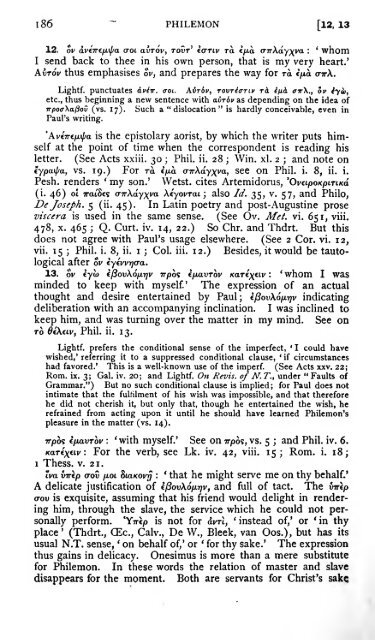Philippians and Philemon - MR Vincent - 1906.pdf
Philippians and Philemon - MR Vincent - 1906.pdf
Philippians and Philemon - MR Vincent - 1906.pdf
You also want an ePaper? Increase the reach of your titles
YUMPU automatically turns print PDFs into web optimized ePapers that Google loves.
^ 1 86<br />
,<br />
PHILEMON [12, 13<br />
12. ov aveVe/xi/'a ' ' c/Aa ;( : whom<br />
I send back to thee in his own person, that is my very heart.'<br />
thus emphasises ov, <strong>and</strong> prepares the way for .<br />
Lightf. punctuates 4. . , , \,, iyai,<br />
etc., thus beginning a new sentence with as depending on the idea of<br />
(vs. 17). Such a "dislocation" is hardly conceivable, even in<br />
Paul's writing.<br />
'AviVe/Mi/'a is the epistolary aorist, by which the writer puts him-<br />
self at the point of time when the correspondent is reading his<br />
letter. (See Acts xxiii. 30 ; Phil. ii. 28 ; Win. xl. 2 ; <strong>and</strong> note on<br />
iypaypa, VS. 1 9.) For c/u-a,see on Phil. i. 8, ii. i.<br />
Pesh. renders * my son.' Wetst. cites Artemidorus,<br />
(i. 46) ol Trat'Se? ; also Id. 35, V. 57, <strong>and</strong> Philo,<br />
Oe Joseph. 5 (ii. 45). In Latin poetry <strong>and</strong> post-Augustine prose<br />
viscera is used in the same sense. (See Ov. Met. vi. 651, viii.<br />
478, X. 465 ; Q. Curt. iv. 14, 22.) So Chr. <strong>and</strong> Thdrt. But this<br />
does not agree with Paul's usage elsewhere. (See 2 Cor. vi. 12,<br />
vii. 15 ; Phil. i. 8, ii. i ; Col. iii. 12.) Besides, it would be tautological<br />
after ov /.<br />
13. ov * « £« : whom I was<br />
minded to keep with myself The expression of an actual<br />
thought <strong>and</strong> desire entertained by Paul; indicating<br />
deliberation with an accompanying inclination. I was inclined to<br />
keep him, <strong>and</strong> was turning over the matter in my mind. See on<br />
TO ^€«, Phil. ii. 13.<br />
Lightf. prefers the conditional sense of the imperfect, could have<br />
wished,' referring it to a suppressed conditional clause, ' if circumstances<br />
had favored.' This is a well-known use of the imperf. (See Acts xxv. 22;<br />
Rom. ix. 3; Gal. iv. 20; <strong>and</strong> Lightf. On Revis. of N.T., under "Faults of<br />
Grammar.") But no such conditional clause is implied; for Paul does not<br />
intimate that the fulfilment of his wish was impossible, <strong>and</strong> that therefore<br />
he did not cherish it, but only that, though he entertained the wish, he<br />
refrained from acting upon it until he should have learned <strong>Philemon</strong>'s<br />
pleasure in the matter (vs. 14).<br />
TT/jo? : 'with myself.' See on %, vs. 5 ; <strong>and</strong> Phil. iv. 6.<br />
: For the verb, see Lk. iv. 42, viii. 15; Rom. i. 18;<br />
I Thess. v. 21.<br />
virkp SiaKovrj '<br />
: that he might serve me on thy behalf.'<br />
A delicate justification of,<strong>and</strong> full of tact. The<br />
is exquisite, assuming that his friend would delight in rendering<br />
him, through the slave, the service which he could not personally<br />
perform. is not for ' , instead of,' or * in thy<br />
place' (Thdrt., CEc, Calv., De W., Bleek, van Oos.), but has its<br />
usual N.T. sense, * on behalf of,' or * for thy sake.' The expression<br />
thus gains in delicacy. Onesimus is more than a mere substitute<br />
for <strong>Philemon</strong>. In these words the relation of master <strong>and</strong> slave<br />
disappears for the moment. Both are servants for Christ's sake





